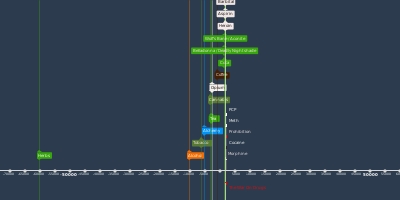Prohibition (1 janv. 1920 – 5 déc. 1933)
Description:
Grown from the seeds of the Unholy Trinity of Religion, War, and Fear, the American constitutional prohibition of alcohol came in on the coattails of the first World War like the world’s meanest black cat. Given that the war was with Germany, Germans were associated with beer, and taverns & saloons sold beer, that logically meant the bars had to go. However, the distaste of immigrants prevalent in that era definitely contributed, as immigrants of all backgrounds, speaking all languages, be they Polish, German, Lithuanian, or something else entirely, had bars they often frequented en-masse, which were spun as places of sin full of drunkards. On top of the mess, the Women’s Christian Temperance Union, telling extravagant tales of domestic violence at the hands of drunk husbands and throwing stones through bar windows, demanded that alcohol vanish off the map, asking people to “think of the women and children” no less. With all this yammering over it, the damning of the immigrant population, and the combining political pressure over a period of years, the vote was finally made, and with enough browbeating, it was included in the Constitution in 1920, by majority vote, as the 18th Amendment.At first, prohibitionists claimed that seeing the U.S go dry would be a grand moral victory over sin, and that it would be of benefit to us all. However, alcohol was not a cultural facet and traditional element so easily given up. For a few years, people certainly did start drinking up to a third less than they did, but not for reason of temperance. Rather, supply disappeared for the most part, and many were not yet willing to disregard the law, but demand never dropped. Unfortunately for the prohibitionists, supply will always rise to the demand, and so the first bootleggers found employ, smuggling expensive alcohol from Canada and a few South American islands up to the East Coast in places like New Jersey by boat, selling it to choice buyers bottle-by-bottle, or running it to stores, underground bars, and the like for mass sale. As those in charge caught wind of these operations, things gradually escalated, with police raids and seizures reminiscent of today’s drug busts going from rare to fairly common. Padlocks were put on buildings rightfully owned by bootleggers to keep them out, undercover officers put on disguises to con people into incriminating themselves, and fake bars were set up to try and net more arrests. Even prohibitionists themselves and the KKK eventually joined the chaos, as violence and a degree of lawlessness began with the start of the Rum Wars, mobs raiding suspected bootleggers with stereotypical torches and pitchforks, resulting in more than one death over the years. Ultimately, it took 13 years of this sort of madness before Franklin D. Roosevelt had the opportunity to implement the 21st amendment, repealing the 18th but retaining a restriction for transporting alcohol over state lines and borders.
Ajouté au bande de temps:
Date:
1 janv. 1920
5 déc. 1933
~ 13 years
